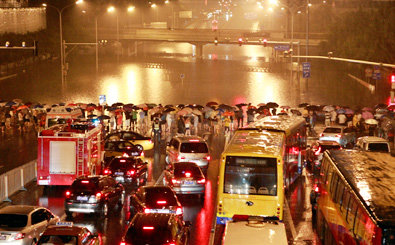Beijing disaster necessitates risk analysis
- By Liu Tao
 0 Comment(s)
0 Comment(s) Print
Print E-mail China.org.cn, July 30, 2012
E-mail China.org.cn, July 30, 2012
|
|
|
Passengers and vehicles are stranded by floodwaters near Guangqumen Bridge on the East Second Ring Road in downtown Beijing on July 21. [File photo] |
In our country, which is famous for its ability to mobilize, we have always been able to recover from the deadliest of natural disasters with coordinated rescue efforts and national unity.
However, most people cannot believe that a tragedy like the recent Beijing floods could happen in a super-modern city - the core area of our nation, during the recent unexpected rainstorm.
The rainstorm in Beijing caught people off guard, reflecting that our city infrastructure and disaster prevention capabilities are lagging behind, and our risk prevention strategies cannot match the pace of our cities' rapid pace of development.
After the rainstorm, the national media sang the praises of the Beijing spirit while also criticizing the city's infrastructure. But the core problem that has not attracted public attention is risks of modern society.
German sociologist Ulrich Beck affirmed that modern society is a risk-oriented society. In the pre-modern era, as people were mainly living in the countryside, social risk was also decentralized. Only during the process of modern industrialization, when people started to migrate to the industrial centers and formed ultra-large cities, social risk started to become centralized around urban areas.
With the centralization of the population, cities are facing not only facing the increasing threats of industrial pollution, environmental deterioration and a rise in crime rates, but also are more prone to natural disasters, civil unrest and terrorism.
Geographic location and level of infrastructure development largely affects a city or region's flood risk. Places at lower altitude, regions with underdeveloped infrastructure or urban-rural fringe zones can be considered severe-risk areas. Therefore, we need to conduct detailed risk evaluations of urban areas and their surroundings. The evaluation should be based on the "urban risk structure" and "risk probability" and cover every region to eradicate the blind spots. Relevant quantitative research and statistical models for risk management also need to be established.
At this point, we need to learn from Germany. Germany has not had many natural disasters. But the German people's risk awareness is very strong. In fact, this consciousness of risk prevention has almost become part of the public subconscious. Each city has completed various comprehensive comparative studies or specific risk evaluations of potential threats.
Despite this state of preparedness, there was widespread discontent when Odra River flooded in 1997. In 2002, 21 people were left dead in the River Elbe floods, with property losses reached 9 billion euros. And in 2006, the River Elbe flooded again, but with fewer losses.
Perhaps, it's too hard for us to gain a zero casualty rate for major natural disasters. No matter how perfect a prevention system we think we've built, it still will have loopholes. Even countries like Germany cannot avoid deaths or injuries when disasters strike.
But a modern civilized country should pursue the following goals: to strive for a zero casualty rate and to make sure no citizen complains about not having enough information about public emergency preparedness plans prior to the disaster. This might be a mission impossible. But making positive steps towards these goals is a clear sign of social progress.
Chinese scholars on urban space sociology and risk sociology should enhance their cooperation with government to establish an urban risk prevention coefficient and early warning systems. Meanwhile, governments should mobilize the vast social organizations like the residential district committees to promote urban flood prevention knowledge and awareness. Governments should also post timely information on websites and absorb online public comments and warnings. With such efforts, we can gradually form a common view and awareness of flood prevention.
The author is a lecturer of Sociology in Bielefeld University, Germany. He has research interests in social security of Europe and China, International Strategy, sociology theories, rising of China and China model.
This article was first published in Chinese and translated by An Wei, Li Shen.
Opinion articles reflect the views of their authors, not necessarily those of China.org.cn







Go to Forum >>0 Comment(s)